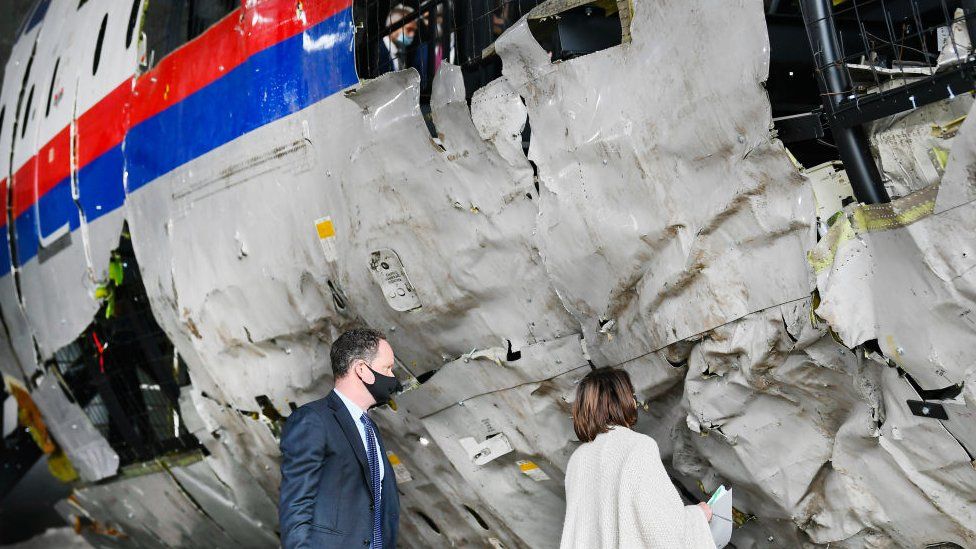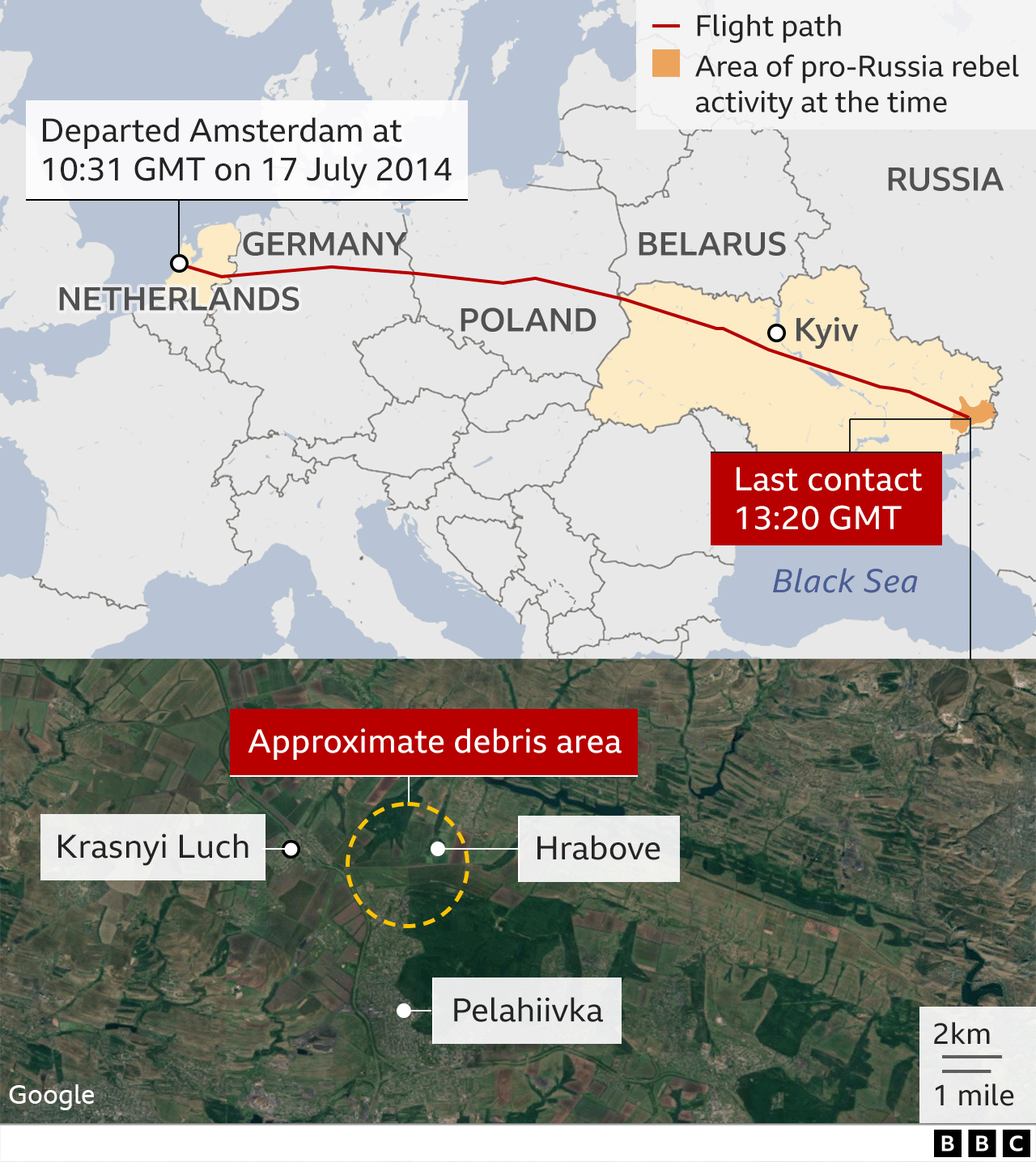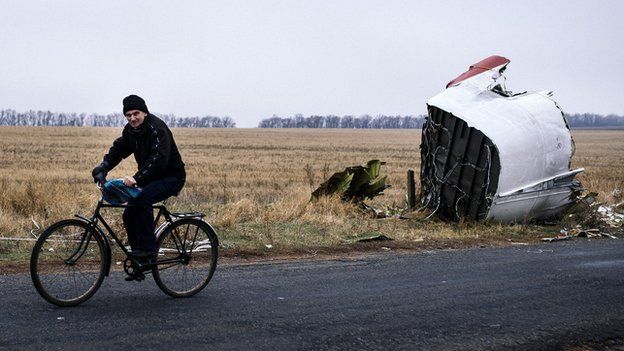 Pool/Getty Images
Pool/Getty ImagesAustralia has called on Russia to extradite three men found guilty of downing a Malaysia Airlines plane over Ukraine with 298 people on board.
Two Russians and a Ukrainian have been sentenced to life by a Dutch court but are thought to be in Russia.
“We call on Russia to surrender those convicted, so they may face the court sentence for their heinous crime,” said Foreign Minister Penny Wong.
Russia condemned the verdict as scandalous and politically motivated.
It is extremely unlikely that the three men will be handed over to face justice.
More than eight years after flight MH17 was shot down by a Russian-made missile over eastern Ukraine, the court concluded on Thursday that the missile had been fired deliberately to bring down a plane, even if the target had been a military aircraft rather than a civilian airliner.
The two Russians, Igor Girkin and Sergei Dubinsky, and Ukrainian Leonid Kharchenko, were all senior figures in the so-called Donetsk People’s Republic (DPR), set up by so-called separatists when war broke out in eastern Ukraine months before MH17 was brought down.
The court found that Russia had overall control over the DPR and that there was ample evidence of contact with Moscow before and after the attack.
All three were found guilty in absentia of mass murder and bringing down the plane. A fourth man who had legal representation at the trial, Oleg Pulatov, was cleared of all charges.

Of the 298 passengers and crew, 196 were Dutch while many of the other passengers came from Malaysia, Australia, the UK, Belgium and other countries.
Visibly moved, the Australian foreign minister told reporters that the Dutch court had delivered justice and truth for everyone on board, including 38 Australians, as well as for their families.
“I’ve been on that flight, and so have many Australians, and that these people could decide to down a civilian aircraft… with children on it is beyond words,” said Ms Wong.
Ria van der Steen, who lost her father and stepmother in the attack, said that after more than eight years there was justice for the victims and their relatives: “I’m glad Russia has not succeeded in claiming complete innocence over and over again with manipulated evidence.”
However, the Australian plea for Russia to extradite the three men is likely to go unheeded in Moscow.
The Russian foreign ministry has denounced both the trial and the verdict as “based on a political order to reinforce the version promoted by The Hague” as well as by international investigators about Russia’s involvement in the attack.
“The trial in the Netherlands has every chance of becoming one of the most scandalous in the history of legal proceedings with its extensive list of oddities, inconsistencies and dubious arguments of the prosecution, which nonetheless formed the basis of the verdict,” said a statement on the foreign ministry’s website.
Securing justice for families
In the years after the attack, a joint international investigation pieced together what happened in the skies over eastern Ukraine, shipping back to the Netherlands the scraps of wreckage of the plane so they could establish how it was shot down.
They concluded that a Russian-made Buk missile was fired from a Buk-Telar missile launcher in a field near Pervomaiskyi in eastern Ukraine, which was at the time held by Russian-backed fighters. The missile system had just been transported from Russian territory into eastern Ukraine – a journey corroborated by witnesses on the route. It was then driven back to Russia on a Volvo truck.
Russia put forward a range of alternative theories, including a claim that the missile launcher was fired from a Ukrainian-held position. The Dutch court ruled that the Russian evidence was both falsified and not independently assessed.
Ukrainian President Volodymyr Zelensky said those higher up the Russian command should be tried for the downing of MH17 as well: “Punishment for all Russian atrocities – both then and now – will be unavoidable.”
Parliamentary speaker Ruslan Stefanchuk said the trial should now be followed by the creation of a special international tribunal for Russian aggression against Ukraine.
UK Foreign Secretary James Cleverly said the verdict was “an important step in securing justice for the families of the victims”.
Who was convicted?
Igor Girkin: Of the three men sentenced to life in jail, Girkin is the best known. Also known as Igor Strelkov, he is an ex-colonel in Russia’s FSB security service who became a high-ranking figure in Russia’s proxy force in the Donetsk region of eastern Ukraine.
This video can not be played
To play this video you need to enable JavaScript in your browser.
The Dutch court found he was the DPR’s highest military leader and ultimately responsible for the missile launcher being deployed. During the trial it emerged that Girkin had been in contact with Moscow about the need for Buk missile defences.
Girkin has been an outspoken critic of Russia’s military tactics in Ukraine, but for the past month he has described serving in an active Russian volunteer unit.
Sergei Dubinsky: Another Russian citizen and former officer in Russia’s GRU military intelligence, Dubinsky was a deputy of Igor Girkin when MH17 was brought down.
The judges ruled that the Buk-Telar launcher came to Ukraine on his initiative and that he organised and directed its position. In a wiretap conversation shortly after MH17 was shot down, Dubinsky is heard talking to Leonid Kharchenko, the third man found guilty, about “their Buk” shooting down an aircraft.
Prosecutors said that in the hours after MH17 was shot down, Girkin instructed Dubinsky to remove the Buk launcher.
Leonid Kharchenko: A Ukrainian citizen who led a combat unit, he is said to have taken orders directly from Dubinsky. The judges ruled that he and Dubinsky had co-operated closely with each other and with the launcher’s crew, as “co-perpetrators in the downing of flight MH17”.
Prosecutors said that in the hours after MH17 was shot down, Dubinsky passed on Girkin’s orders to move the missile launcher to Kharchenko, who is described as guarding the Buk-Telar. Asked earlier if it is in danger of being hit by artillery fire, he is heard to say: “They won’t reach it. We are too far away.”
-
MH17 plane crash in Ukraine: What we know
-
26 February 2020

-
